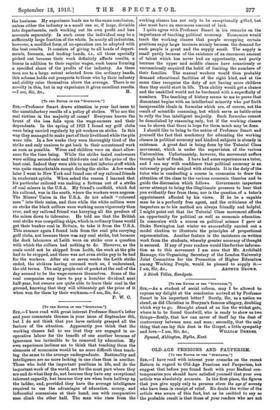[To THE EDITOS OF THE "SPECTATOR."] SIR,—Professor Smart draws attention
in your last issue to the unsatisfactory results of a policy 9f strikes. Who are the real victims in the majority of cases ? Everyone knows the brunt of the loss falls upon the wage-earners and their dependents. In the spring of 1912 I found my golf clubs were being carried regularly by pit workers on strike. In this way they managed to make part of their livelihood while the pits were idle. In a few weeks they were thoroughly tired of the strike and only anxious to get back to their accustomed work as soon as possible. Wives and children were on short allow- ance for the time being. While the strike lasted coalowners were selling second-rate and third-rate coal at the price of the best coal. Indeed they were able to market inferior stuff which was quite unmarketable except during the strike. A few weeks later I went to New York and found one of my railroad friends in exuberant spirits. When asked the reason I learned that his particular railroad was making a fortune out of a strike of coal miners in the U.S.A. My friend's coalfield, which fed his railroad, was in the south, where the workers were negroes- The Miners' Union in the U.S.A. do not admit "coloured men" into their union, and thus while the white colliers were on strike the black colliers were working more vigorously than ever, and my railroad friend was hurrying all the produce of the mines down to tidewater. He told me that the British coal strike was compelling ships, which in ordinary times would get their bunker coal in Britain, to take it from the U.S.A. This summer again I found lads from the coal pits carrying golf clubs, not because there wae any coal strike, but because the dock labourers at Leith were on strike over a question with which the colliers had nothing to do. However, as the coals could not be shipped from Leith, the work at the pits had to be stopped, and there was not even strike pay to be had for the workers. After six or seven weeks the Leith strike ended, the strikers having resumed work on, I understand, the old terms. The only people out of pocket at the end of the day seemed to be the wage-earners themselves. Some of the coal companies may have to pay a humbler dividend next half-year, but owners are quite able to leave their coal in the ground, knowing that they will ultimately get the price of it when won for them by their workmen.—I am, Sir, &c.,
P. W. C.










































 Previous page
Previous page